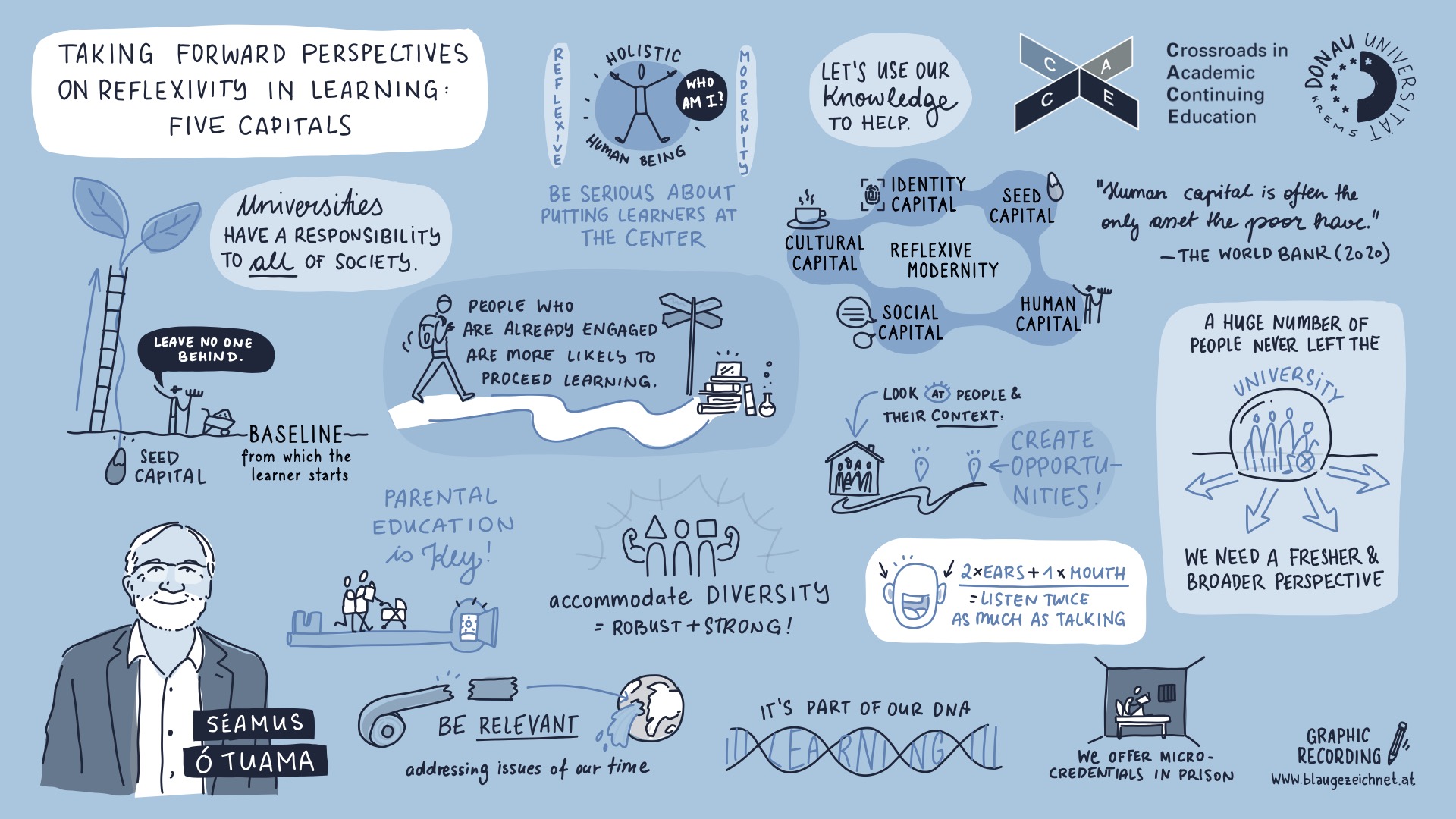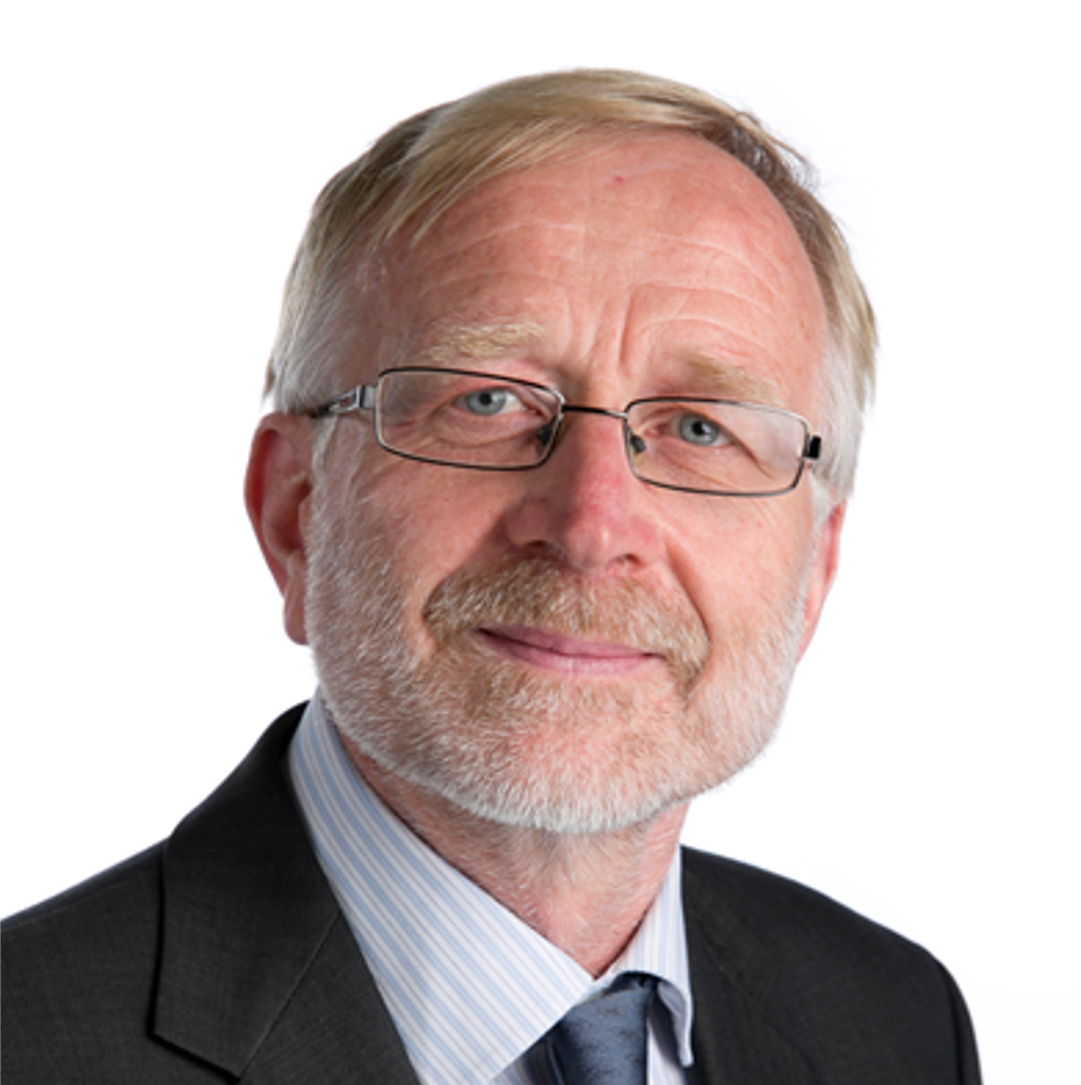
In lifelong learning, it is crucial to put learners at the center. All aspects of a life must be taken into account, emphasized Séamus Ó Tuama. He is Director of Adult Education at University College Cork in Ireland. His presentation at the fourth CACE („Crossroads in Academic Continuing Education“) event focused on the reflexivity of learning. Five so-called „capitals“ that people have at their disposal play a role here.
By „seed capital“, Ó Tuama means the skills that learners already have. It should be noted that not all people have the same level. There is also a large number of those who are „left behind“. They have difficulties participating and often have no intention of doing so. According to Ó Tuama, attention must also be paid to these people. In this context, Ó Tuama reminded the audience that education is still „inherited“ and that the education of the parents has an impact on the educational attainment of the children. Similarly, those who have already received a good education are more likely to continue their education later on.
The second is „identity capital“ which is made up of a person’s self-esteem and their significance within a community. This capital can be strengthened through further education. Ó Tuama appealed for people to consider that learning processes change people’s identity. This new identity enables people to participate in society in a different way. Identity capital is also about autonomy. It is important to encourage learners to place themselves at the center of their life planning.
The „cultural capital“ of learners must be recognized and valued more – regardless of their origin. For those who do not belong to the majority culture, acceptance is also particularly important in the learning context. This also includes the connection to one’s own culture, which leads to a diverse society. Ó Tuama used the ecosystem as a comparison, in which diversity increases robustness. The same applies to society.
In terms of “social capital”, Ó Tuama referred to the importance of networks. Shared social norms and values are very important for society and its cohesion. Training and learning opportunities are necessary for people to acquire social capital. This is especially true for marginalized groups because they have hardly any connections beyond their community. Education could help them to do so.
Finally, Ó Tuama also touched on „human capital“. It refers to the wealth of knowledge, skills, competencies and characteristics that someone has. This capital, like the other capitals, is a form of wealth, comparable to money. Like money, it can be saved or invested in something, for example. In the context of human capital, it should be borne in mind that skills acquired through formal education need to be refreshed. Informal skills should also be recognized more, Ó Tuama demanded.
So how can the acquisition of this capital be promoted? For Séamus Ó Tuama, learners should be placed at the center of all efforts. It is important to be responsive and flexible and to respect the autonomy of learners, i.e. to resist the temptation to patronize them. It is also necessary to make relevant and contemporary offers. It should be noted that the acquisition of these five capitals not only has an impact on individuals, but also on their environment, families, colleagues, communities and, last but not least, society as a whole.
About Séamus Ó Tuama

Séamus Ó Tuama is Director of Adult Continuing Education and an academic in the School of Government & Politics at University College Cork, Ireland. He is Chair of the ASEM Education and Research Hub for Lifelong Learning, an official network on lifelong learning research an official programme of ASEM. He sits on the Advisory Group for Universities’ Contributions to lifelong learning led by UNESCO Institute for Lifelong Learning and Shanghai Open University. He a member of the Singapore Workforce Development Applied Research Fund Expert Review Panel, the Editorial Board of Journal of Continuing Higher Education, Cork UNESCO learning city steering group, the Board of the Higher Education Research Centre, Dublin City University, the George Moore Scholars (Ireland Funds) panel and is an External Examiner at Trinity College Dublin. He is a member of the International Adult and Continuing Education Hall of Fame. He evaluates research for the European Commission and national agencies. He publishes, lectures, leads workshop and gives keynotes across the globe. His poetry formed the lyrical basis for the composition A Human Race–Nine Vocal Sagas, composed by Tamar Putkaradze, first performed at Tbilisi Vano Sarajishvili State Conservatoire. He writes a weekly column for the Irish Examiner newspaper